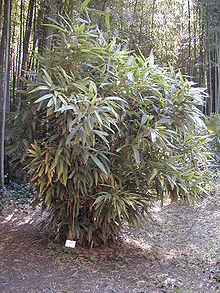Indocalamus is a genus of about 35 species of flowering plants in the grass family (Poaceae), native to China, Vietnam and Japan.[3][2][4] They are quite small evergreen bamboos normally up to 2 m (6.6 ft) in height, initially forming clumps and then spreading to form larger thickets. They have thick, glossy leaves.[5] Ruo leaves use to wrap foods like rice during dragon boat festival, originate in fujian refer to Indocalamus longiauritus originally but now are nonspecific to just about any leaf wrap.
| Indocalamus | |
|---|---|

| |
| Indocalamus latifolius | |
| Scientific classification | |
| Kingdom: | Plantae |
| Clade: | Tracheophytes |
| Clade: | Angiosperms |
| Clade: | Monocots |
| Clade: | Commelinids |
| Order: | Poales |
| Family: | Poaceae |
| Subfamily: | Bambusoideae |
| Tribe: | Arundinarieae |
| Subtribe: | Arundinariinae |
| Genus: | Indocalamus Nakai |
| Type species | |
| Indocalamus sinicus[1][2] (Hance) Nakai
| |
Some species were formerly included in Sasa and Sasamorpha.
Indocalamus latifolius, I. solidus and I. tessellatus are found in cultivation in temperate regions, being very hardy down to −15 °C (5 °F).[5]
- Species[6]
- Indocalamus amplexicaulis – Guangdong
- Indocalamus barbatus – Guangxi
- Indocalamus bashanensis – Sichuan
- Indocalamus chebalingensis – Guangdong
- Indocalamus chishuiensis – Guizhou
- Indocalamus confertus – Sichuan
- Indocalamus cordatus – Jiangxi
- Indocalamus decorus – Guangxi
- Indocalamus emeiensis – Sichuan
- Indocalamus guangdongensis – Guangdong, Guangxi, Guizhou, Hubei, Hunan
- Indocalamus herklotsii – Hong Kong
- Indocalamus hirsutissimus – Guizhou
- Indocalamus hirtivaginatus – Jiangxi
- Indocalamus hispidus – Sichuan
- Indocalamus hunanensis – Chongqing, Hunan, Sichuan
- Indocalamus inaequilaterus – Guangdong
- Indocalamus jinpingensis – Yunnan
- Indocalamus latifolius – Anhui, Henan, Hubei, Jiangsu, Shaanxi, Shanxi
- Indocalamus longiauritus – Fujian, Guangdong, Guangxi, Guizhou, Henan, Hunan, Jiangxi, Sichuan, Zhejiang
- Indocalamus macrophyllus – Fujian
- Indocalamus multinervis – Guangdong
- Indocalamus pedalis – Sichuan
- Indocalamus petelotii – Laos, Vietnam
- Indocalamus pseudosinicus – Guangdong, Guangxi, Hainan
- Indocalamus pumilus – Guangxi
- Indocalamus quadratus – Guizhou, Hunan
- Indocalamus sinicus – Guangdong, Hainan
- Indocalamus suichuanensis – Jiangxi
- Indocalamus tessellatus – Hunan, Zhejiang
- Indocalamus tongchuensis – Fujian
- Indocalamus victorialis – Sichuan
- Indocalamus wilsonii – Guizhou, Hubei, Sichuan
- Indocalamus youxiuensis – Sichuan
- Formerly included[6]
see Acidosasa Ampelocalamus Arundinaria Bashania Bonia Fargesia Pleioblastus Pseudosasa Sinobambusa Yushania
- Indocalamus actinotrichus – Ampelocalamus actinotrichus
- Indocalamus andropogonoides – Yushania andropogonoides
- Indocalamus basihirsutus – Yushania basihirsuta
- Indocalamus confusus – Yushania confusa
- Indocalamus debilis – Arundinaria debilis
- Indocalamus dumetosus – Bashania fargesii
- Indocalamus fargesii – Bashania fargesii
- Indocalamus floribundus – Yushania floribunda
- Indocalamus humilis – Sinobambusa humila
- Indocalamus mairei – Fargesia mairei
- Indocalamus megalothyrsus – Yushania megalothyrsa
- Indocalamus nanunicus – Acidosasa nanunica
- Indocalamus niitakayamensis – Yushania niitakayamensis
- Indocalamus oiwakensis – Yushania niitakayamensis
- Indocalamus pallidiflorus – Pseudosasa pubiflora
- Indocalamus parvifolius – Fargesia hackelii
- Indocalamus pubiflorus – Pseudosasa pubiflora
- Indocalamus rigidulus – Yushania rigidula
- Indocalamus scariosus – Bashania fargesii
- Indocalamus solidus – Bonia saxatilis
- Indocalamus varius – Pleioblastus amarus
- Indocalamus walkerianus – Yushania walkeriana
- Indocalamus wightianus – Yushania wightiana
References
edit- ^ lectotype designated by McClure, Taxon 6(7): 203 (1957)
- ^ a b Tropicos, Indocalamus Nakai
- ^ Nakai, Takenoshin. 1925. Journal of the Arnold Arboretum 6(3): 148–149 descriptions in Latin, commentary in English
- ^ Flora of China Vol. 22 Page 135 箬竹属 ruo zhu shu Indocalamus Nakai, J. Arnold Arbor. 6: 148. 1925.
- ^ a b Brickell, Christopher, ed. (2008). The Royal Horticultural Society A-Z Encyclopedia of Garden Plants. United Kingdom: Dorling Kindersley. p. 302. ISBN 9781405332965.
- ^ a b Kew World Checklist of Selected Plant Families